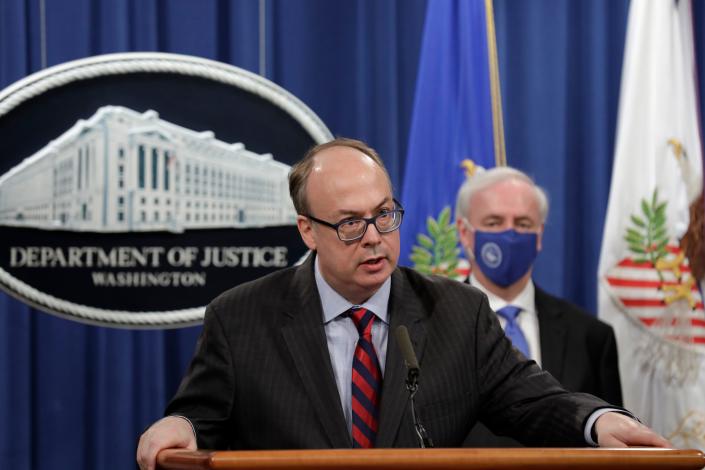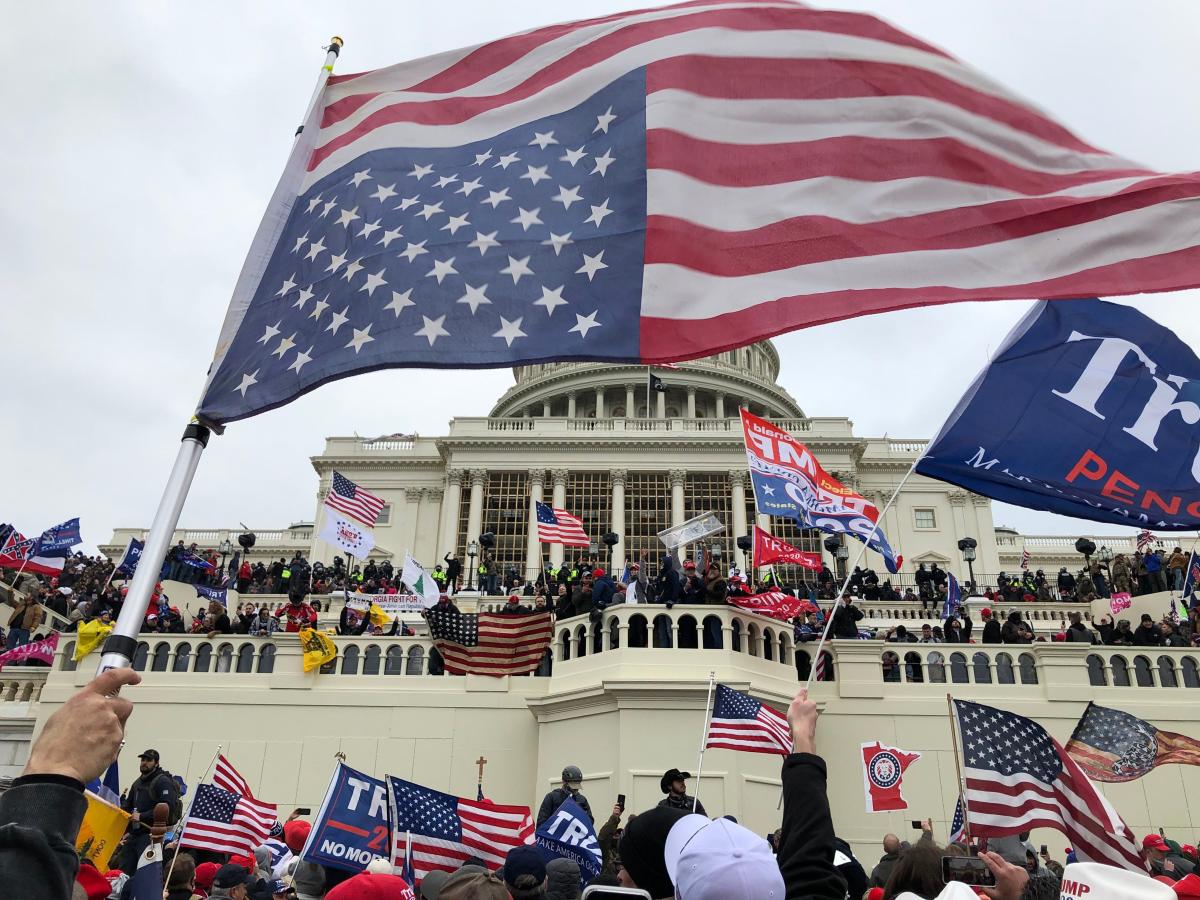What started off as an unprecedented moment in America’s history at the beginning of the year has now become routine.
For the third time during the 2024 presidential campaign, former President Donald Trump has been formally accused of a crime. And in each case, the latest indictment has been more troubling than the last.
In the latest case, federal prosecutors are accusing the Republican front-runner of undermining American democracy by organizing a wide-ranging conspiracy to steal the 2020 election that prosecutors allege fueled a brazen and historic insurrection at the U.S. Capitol.
“The attack on our nation’s capitol on Jan. 6 2021, was an unprecedented assault on the seat of American democracy,” Justice Department special counsel Jack Smith, who led the investigation, said at press conference Tuesday.
“As described in the indictment, it was fueled by lies — lies by the defendant targeting and obstructing a bedrock function of the US government.”
Trump has repeatedly made false statements about the last presidential contest, which he lost to President Joe Biden. But the consequences thus far have been political losses.
What’s different now is he faces the harshest accusation yet from the federal government: Namely, that his motivation was a criminal effort to cling to power.
Here are important things to know in the wake of the third indictment.
Trump knowingly spread lies about 2020 election

Central to the Justice Department’s case against Trump, according to Smith, is the former president knew that he lost the 2020 election, yet he still spread knowingly false claims of election fraud.
The indictment singles out Trump’s false claims of large numbers of dead or other ineligible citizens who voted, “suspicious vote dumps” that hurt Trump’s chances, and rigged election machines.
“These claims were false, and the defendant knew there were false,” the 45-page indictment reads. “In fact, the defendant was notified repeatedly that his claims were untrue – often by people on whom he relied on for candid advice on important matters, and who were in best position to know the facts.”
The indictment alleges that almost everyone in Trump’s orbit repeatedly told him that his fraud claims were wrong. Among them were former Vice President Mike Pence, Trump’s senior Justice Department, his director of National Intelligence, senior White House attorneys, senior campaign staffers and state election officials.
But he didn’t listen, according to the indictment, which calls Trump’s knowingly false statements “integral to his criminal plans” to stop the certification of the election.
Trump directed Jan. 6 rioters, created fake electors scheme

The indictment also alleges Trump, along with six unnamed co-conspirators, did more than just lie about the 2020 election outcome.
Smith’s case lays the violent insurrection at the former president’s feet, saying he “attempted to exploit the violence and chaos” by directing supporters to the Capitol in an attempt to bully lawmakers to delay the certification of the results.
The indictment also outlines ways in which Trump and the unidentified co-conspirators tried to carry out their plan to stay in power ahead of the Jan. 6 riot, including a plot to get a fraudulent slate of electors in seven states in order to flip the results where Biden had won.
After failing to pressure state officials to change the outcome in early December 2020, the feds allege, Trump and his allies developed a new plan to “marshal individuals who would have served as (his) electors” who would have then sent “false certifications that they were legitimate electors.”
Some of the fake electors were “tricked” into participating in the scheme, according to the indictment.
The right to lie? Breaking down Trump’s charges
Smith, in the indictment, makes clear that lying about an election isn’t a crime and that Trump has a First Amendment right to lie and challenge the results in court.
“The defendant had a right, like every American to speak publicly about the election and even to claim, falsely, that there had been outcome-determinative fraud during the election and that he had won,” the indictment said.
Instead, he argues, it was Trump’s deliberate use of “widespread mistrust” about the election that perpetrated three specific criminal conspiracies targeting the nation’s process of collecting, counting and certifying presidential election results.
The conspiracy charges Trump with:
-
A conspiracy to defraud the United States by using “dishonesty, fraud and deceit” about the 2020 election
-
A conspiracy to corrupt and impede the Jan. 6, 2021 meeting in which Congress counted electoral votes
-
A conspiracy against the right to vote and to have one’s vote counted
The fourth count against Trump is obstruction of and attempt to obstruct an official proceeding related to his actions on Jan. 6.
In many ways the charges and evidence cited by prosecutors mirror the findings and recommended charges from a congressional House committee that investigated the Jan. 6 insurrection last year.
Who are the co-conspirators?

The indictment only charges Trump, but it references six co-conspirators who helped him with this plot.
Although they are not named, the indictment outlines several details about them including their role and behavior, such as key attorneys, a political consultant and a Justice Department official who prosecutors say schemed with the former president to open “sham election crime investigations” and “influence state legislatures.”
That is reportedly Jeffrey Clark, a high-ranking Justice Department official during the Trump administration who worked on civil matters and was almost appointed by Trump as acting attorney general in the final days of his term.
Smith could seek to indict some, or all, of the co-conspirators in the weeks ahead.
Trump to Pence: ‘You’re too honest.’

One of more intriguing details in the indictment is the deteriorating relationship between Trump and Pence, who was being pressured to leverage his role as vice president to help the plot.
Pence, who is seeking the GOP presidential nomination in 2024, refused to play along, saying he didn’t have the authority to block the election’s certification. That infuriated Trump and his supporters, who searched for the vice president through the Capitol on Jan. 6.
At one point, according to the indictment, Trump told Pence, “You’re too honest.”
Speaking on Fox News less than an hour after the third indictment became public, Marc Short, who served as Pence’s chief of staff during the Trump president cast the indictment in political terms.
“The reality is that Donald Trump asked Mike Pence to overturn the results of the election,” Short said. “Do you want a president who willfully puts himself above the law and asks his vice president to disobey his oath to the Constitution?”
Biden and Trump’s rivals react, sort of

Don’t expect the latest indictment against Trump to hurt his chances to secure the 2024 Republican nomination.
If we’ve learned anything from the first and second indictments, it is likely only to strengthen the resolve of Trump’s base. He has amassed a commanding polling lead in the Republican primary despite facing a federal indictment over his handling of classified documents and an indictment in New York over alleged hush-money payments.
The charges against the former president have forced his primary rivals into the awkward position of condemning the Justice Department for targeting their election opponent.
“As President, I will end the weaponization of government, replace the FBI Director, and ensure a single standard of justice for all Americans,” Florida Gov. Ron DeSantis, who is considered Trump’s chief rival, said in response to the latest indictment.
President Biden took a pass on commenting about Trump’s latest indictment, and its implications for the 2024 contest and the country, during his vacation in Delaware this week.
Instead, the president, joined by first lady Jill Biden, went to go see “Oppenheimer,” the celebrated film about the physicist who is described as “the father of the atomic bomb.”
This article originally appeared on USA TODAY: Trump indicted for trying to overturn 2020 election: 6 takeaways







